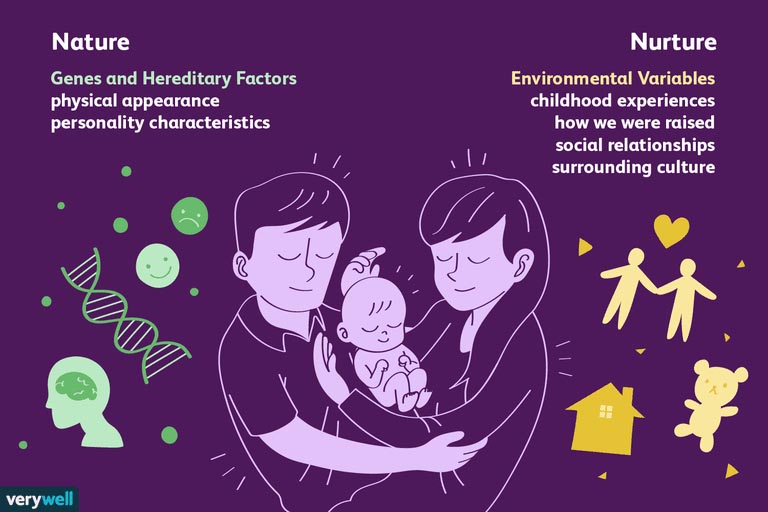In personality psychology, there has been always been a long standing debate around personality development. Do humans act, behave and interact in the way we do because of nature, such as our genes inherited from our parents, or nurture, such as our environmental factors, culture, religion, or childhood interactions?
On Personality and Why It Matters
Personality is a key part of every single one of us, it determines our moods, our behaviours, how we interact with each other, and the decisions we make. Effectively, our personalities make us who we are. This is why, it is crucial to study whether an individual's personality is caused by our ancestors, the environment we grew up in, on perhaps, even both.
Research has found that personality changes and adapts throughout our whole life, but the reasons as to why is still up for debate. Could it be that our environmental influences constantly change and adapts us? Or could it be that our genetics influence when and how personality trait change happens?

Nature vs Nurture: The Never-Ending Battle
How many times have you heard the saying “oh, she’s definitely her mother’s daughter!’ or “like father, like son” - perhaps it’s because 50% of your DNA comes from each of your parents and this is inherited genetic makeup could influence your personality.
If our personality and behavior are influenced solely by nature, then we would have inherited genes from our ancestors that influence how our personality is shaped. It’s just the same as how we inherited physical factors such as our eye or hair colour from previous generations, we also could inherit our internal drive and spur that influences our behaviours.
The Genetics Argument
Genes within a species are all the same - the DNA within you genes is most likely 99.9% similar to mine. This allows use to develop personality characteristics that come naturally to us. However, some of us are better at things than the other. We all have the instincts to learn language and to walk - why do some of us do it better than others?

“The biological personality theories assume that personality differences are partly based in individual differences in structure and systems in the central nervous system such as genetics, hormones, and neurotransmitters" - suggesting that our personality differs due to the genes we develop and how our body regulates these.
Research into twins and adoptive children has shown that our genetic make up has a stronger influence on our personality than child-rearing; providing support for the 'nature' side of the argument. It has also been found that all the traits we inherit, including personality traits, are greatly influenced by our genetics and biology - further supporting the nature argument.
Other, perhaps less scientific theories, have suggested one's personality is caused by our recent ancestors. It wouldn’t surprise me if you’ve heard of ‘psychodynamic theory and therapy’ or of the term the ‘unconscious’ and it also would surprise me if you haven’t heard of any other psychodynamic theorists apart from the notorious Sigmund Freud.
What Does Psychology Have to Say?
One of Freud’s colleagues, Carl Jung believed that our unconscious mind, which the psychodynamic theory argues drives our behaviours, interactions and therefore forms a fundamental part of our personality, is partly comprised of memories from our ancestors and these then influence our personality and behaviour.
Overall, the idea that a person's personality is caused by their genetic makeup is quite a believable one. Often, babies who are relaxed and ‘easygoing’ tend to become adults who are equally as laid back and easygoing. Similarly, the babies, much like myself, who are born screaming and spend much of their infant years throwing tantrums, tend to grow up to be the drama queens of the world. So, there’s a high levels of probability that our personality and cognitive development is in fact influenced by our genetics.
However, when arguing that our personalities are developed by our genetics, a factor that is out of our control raises issues. If our personalities are really caused by our genetics, then can we be held accountable for anything we ever do? Or is it our great, great, great, great, great grandparents' faults? So, it is important to consider the opposing factor - our environment.
Our environment does play a crucial part in our life; some people are rich, some people are poor. Some people grew up in Kensington, whilst others in rural towns miles away from any fast-moving cities. Some people have four sisters, whilst others have no siblings at all. Some people have it easy, whilst others don’t. But, does this really influence our personality and our later behaviour?
The Environment Argument
It is often argued that our personality is in fact influenced more so by our environment than by our genetics. Much of our personality is based on the adaptation of our abilities, cognitive abilities, and social interests. This adaptability that shapes and forms us can only be learned from the interaction with our environment.
Think about children who are bullied, it has often been suggested that the children grow up to be the Introverts of the world - they are petrified of human interaction due to the experiences they had with other children when they were younger. This case shows how early childhood experiences can have a direct effect on a child's personality, moral development, and peer relationships over time.
Studies have shown that personality is caused by the cultural development and the interactions we have with others and our environment when we are a child. Similarly, evidence from studies that have found that children raised in foster homes were influenced greater by their foster parents' child raising, than by their genetics, showing how nurture has an effect on child development.
As I used the example of psychodynamic therapy above, I will use a contradicting theory to argue the opposing point. Freud, the father of the psychodynamic theory, argued that our collective unconscious, which as I said above determines our behaviors and personality, is influenced and developed by our childhood experiences and interactions. This theory, although it has little empirical evidence, is still well regarded today and is the crucial point of psychodynamic therapy.
Finally, if you have siblings your birth order may well have affected your personality. Alfred Adler, a famous psychologist, described the eldest child to feel superior and powerful, the middle child to be competitive and the youngest to be dependent on others for emotional and basic needs. Birth orders have also been observed to cause a certain inferiority complex if you're born later on compared to your siblings.
So, a child is being born into a situation that causes them to react as described in the stereotypes of birth order, and therefore the environment has influenced our personality. To a point, it might even be able to influence certain personality disorders and defense mechanisms later in one's life course. However, little scientific evidence has been found to support this theory, so maybe personality is due to genetics.

Maybe It's Both?
Overall, many psychologists are starting to adopt the view that all aspects of humans are influenced by nature and nurture. Yes, our genetics are inherited, but it has been suggested that they do not determine our behaviour.
Our personalities, and humans in general, are too complicated to be whittled down to one specific cause and we will be influenced by many aspects of ourselves and our environment. We are much too complicated to be one of the other.
Some other theories to look at if you want to understand personality development include:
-
Trait theory
-
Social Cognitive Theory
-
Freud's Theory of Personality
Freud's Stages of Psychosexual Development (Psychosexual stages include Oral Stage, Anal Stage, Phallic Stage, Latent Stage, and Genital Stage)
Take a Personality Test
If you are looking to discover your personality type through tests then I have written a very comprehensive list of the best personality tests which you will find useful.




